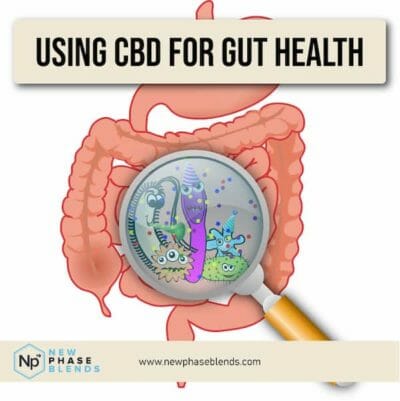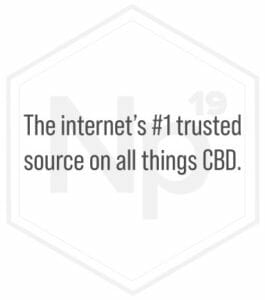Over 2,000 years ago, the father of modern medicine, Hippocrates, stated that “all disease begins in the gut.” And we’ve all heard the old saying, “you are what you eat.” Modern science is discovering there is more than a kernel of truth in these statements. Of all the things to try, does taking CBD for gut health actually work?
When you take some time to think about all of the things that happen in the gastrointestinal (GI) system, you will soon realize that the GI system does more than just digest food. How good or bad your digestive health is can affect many other body systems.
When digestive problems such as Crohn’s disease, leaky gut syndrome, and other GI disorders occur, it is time to look for ways to remedy them. While some look at conventional methods, others are looking at alternatives like CBD oil.
But, does CBD oil help with digestive health?
TL;DR – There are a few ways that using cannabinoids, like CBD, can help your gut out. One of the most important things it can do is help manage unwanted inflammation.
Your Gut Microbiome is Important
Let’s explore how CBD oil may aid the digestive system and help with gastrointestinal disorders. As always, check with a healthcare professional before you use medical cannabis, CBD, or any other type of supplement to help treat a medical condition.
To understand gut health and the health benefits of CBD, we must first look at the gut microbiome. This interesting part of our body is a collection of trillions of bacteria, viruses, and fungi that share a harmonious space inside the body.

This microbiome performs many functions, but a few key ones are digestion of your food and nutrient absorption. Aside from this, it also produces the most neurotransmitters used by the body. Plus, the gut microbiome also regulates cognitive and physiological processes daily, including regulating the immune system.
If your gut microbiota remains in balance, all other systems will also work correctly. However, many significant health problems can occur once gut integrity goes out of balance (called dysbiosis). This is one of the reasons it is essential to maintain gut health.
The importance of a healthy digestive system means you’ll also have a healthy body with healthy systems like your heart. Heart disease is an area of concern in the US, and many suffer from the hardening of the arteries.
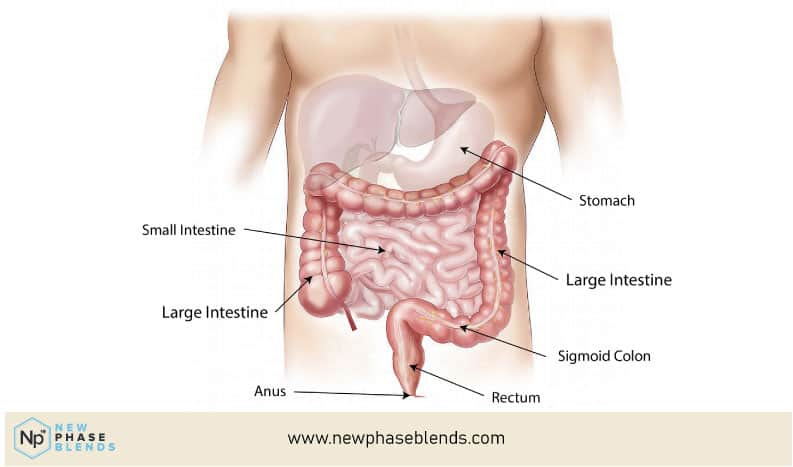
Having good gut health reduces the chances of having heart disease. By increasing your HDL cholesterol, you can achieve better gut health, and your risk of cardiovascular disease decreases. But there are many more reasons to have good gut health.
Some of the other things that happen when poor gut health is present are:
- An increase in bad bacteria resulting in obesity
- Risk of heart attack or stroke
- Possible development of type 2 diabetes
- Risk of high cholesterol
When bad bacteria is present from poor gut health, substances like triethylamine N-oxide (or TMAO) may block a person’s arteries and cause a stroke. One study demonstrated that good gut health helped prevent coronary artery disease.
Is CBD Bad For Your Gut?
No, CBD is not bad at all. It can help your intestinal tract out, quite a bit. Having a healthy gut helps the physical human body, but it also helps with mental health and a properly functioning central nervous system. Information is transmitted from the brain to the gut and back again via the vagus nerve.
Having good bacteria in the gut produces serotonin. Serotonin is one of the most important neurotransmitters that affect mental health. When this bacteria becomes imbalanced, depression and anxiety may occur.
This is why many are studying the effects of using CBD oil for gut health.
The Benefits of CBD
CBD is found in almost all parts of cannabis plants. Remember, cannabis accounts for both hemp (non-intoxicating) and marijuana (intoxicating).
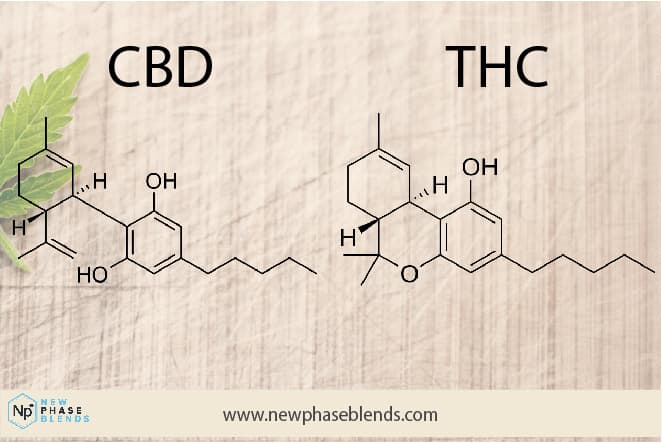
CBD (Cannabidiol) has more therapeutic benefits such as treating inflammatory bowel diseases, chronic pain, improving memory and brain functions.
CBD and the cannabis plant share some common traits with endocannabinoids. The endocannabinoid system is part of the human body. This system produces what are called “endocannabinoids.” These endocannabinoids act similarly to cannabinoids found in CBD products, medical cannabis, or recreational marijuana.
The Endocannabinoid System
CBD and endocannabinoids interact with the endocannabinoid system. It helps the body with digestive issues, inflammatory responses, pain relief, and more. CBD also helps by inhibiting the breakdown of the body’s neurotransmitters.
When this happens, the endocannabinoid system can function more effectively. This helps avoid the potential for a clinical endocannabinoid deficiency in the body.
Another thing that makes CBD and THC different is how they work with the CB1 and CB2 receptors. While THC binds directly to these receptors, CBD binds with these receptors indirectly.
Related read: Cannabinoid Receptors Explained
CBD also prevents the enzyme FAAH from breaking down anandamide. Anandamide is an endocannabinoid neurotransmitter that helps regulate sleep, mood, memory, appetite, and digestion.
CBD’s ability to aid digestion is what scientists are interested in exploring using CBD oils further to help with digestive tract issues.
How CBD Works in Our Bodies
CBD works within the body in a few different ways. When it comes to bacterial cells, the number residing within the gut is ten times the number of human cells within the body. The bacteria within the gut play an integral part in maintaining the health of the digestive tract.
The right kind of bacteria, and in the right numbers, are required to maintain the integrity of the immune system, reduce levels of inflammation, and promote positive mental well-being. Therefore, when gut health is compromised, issues are more likely to occur.
CBD is currently being researched for its potential benefits on gut health. A study conducted in 2019 demonstrated that rats who were suffering inflammation of the brain responded well when given CBD.
The researchers set out to test whether there was a link between the gut microbiome of the rats and the inflammation of the brain that they were experiencing and if administering CBD would help relieve the symptoms.
The result was that the CBD caused levels of a particular bacteria within the gut, Akkermansia muciniphila, to be lowered, resulting in reduced intestinal inflammation within the rats. This indicates that there does appear to be a link between CBD and improvements in gut health.
Inflammation from IBS Symptoms
If you have problems with your digestive system, inflammation is most likely caused by inflammatory bowel disease or intestinal inflammation. When inflammation is present, it can cause all sorts of issues like stomach pain, lack of absorption, and diarrhea.
Some research shows that CBD (cannabidiol) reduces intestinal inflammation. For example, CBD can be used to help a stomach digest capsaicin by decreasing the sensitivity of the capsaicin receptor of the stomach.
This receptor indicates and triggers inflammation from the hot pepper in the mucous membrane of the stomach. The result is that burning sensation we all feel when eating spicy food. You reduce the abdominal pain associated with hot and spicy foods by taking CBD.
Immune Responses
Taking hemp-derived CBD products or medical cannabis for gut health also helps improve the processes of the immune system that come from the gastrointestinal tract. Some studies indicate that taking cannabis oil helps improve the interaction between the immune system and gut bacteria.

When dysbiosis of the gut happens, the immune system becomes hyperactive. A hyperactive immune system begins to generate inflammation and, if left untreated, could result in Crohn’s disease symptoms.
Studies have shown that taking a CBD dosage reduces the hyperactive immune response, improving gut health and the immune system’s ability to handle toxins and allergens.
Reduction of Stress
Many CBD users already claim the stress-reducing benefits of CBD. Reducing stress is also crucial for optimal gut health. Who hasn’t heard someone say “my stomach is in knots” when they feel stressed or anxious?
Stress dramatically restricts the movement of digestion, especially intestinal motility (or how food makes its way through the digestive tract to be eliminated). It can also create problems with gut bacteria and the potential for gut permeability (leaky gut or intestinal permeability).
Studies also show that taking cannabidiol helps restore intestinal barrier dysfunction.
Adrenal Fatigue and Stress Responses
In today’s world, stress can come at all angles. When a person is under a lot of pressure, cortisol levels are elevated. This creates a bunch of problems with heart rate and digestion, but also the adrenal glands also become overburdened, and over time adrenal fatigue can occur.

Cortisol is a stress-fighting hormone produced in the body that comes into play when fighting an illness, inflammation, or dealing with a stressful experience. If these stresses continue, they’ll develop into a chronic disease, and adrenal fatigue will happen.
Adrenal Fatigue Syndrome (AFS) is difficult to diagnose as the symptoms are too vague for conventional lab tests. However, if the symptoms go untreated, it could lead to several physical problems, including digestive problems like gut inflammation.
Studies have shown that taking CBD may help reduce stress. Which also helps reduce the pressures placed on the adrenal glands, allowing the body systems, including digestion, to perform much more efficiently.
Can Taking CBD for Gut Health Affect Your Inflammation Circuit?
Taking CBD can affect inflammation. The neuroendocrine system helps the hypothalamus maintain homeostasis in the body. It is vital for regulating reproduction, metabolism, eating, drinking, energy utilization, and blood pressure. The inflammation circuit of this system activates almost immediately when stress affects your body.
This means that the three organs of this circuit, the immune system, gut microbiota, and the gut, are affected almost immediately. As this circuit goes through a period of dysfunction, the single layer of cells that make up the gut lining becomes compromised, and gut permeability may happen.
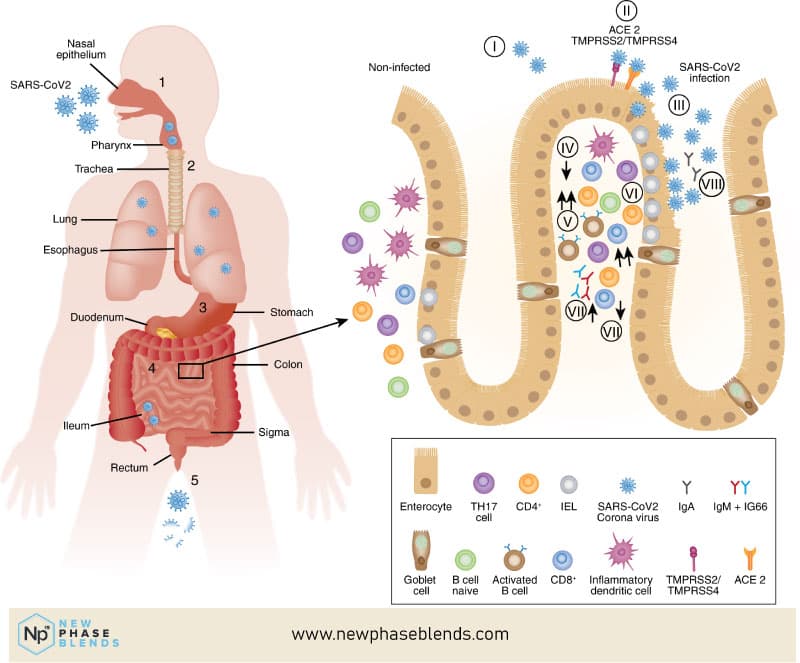
Stress affects the stomach lining making those tight junctions between cells looser. When this happens, undigested particles of food, viruses, bacteria, and fungi enter the bloodstream breaking havoc on your system.
The immune system goes into high gear as these foreign substances enter the bloodstream because it sees them as a threat. The result is increased inflammation as the system tries to locate the substances and destroy them.
If not treated, the immune system can become hyperactive to defend itself from these substances that escape the gut barrier. This may create autoimmune conditions and chronic illnesses. Everything related to the gut goes into overdrive.
The microbiome is affected by an imbalance in bacteria leading to ailments like:
- Bacteria overgrowth of the small intestines (or SIBO)
- Leaky Gut Syndrome
- Irritable bowel syndrome (IBS)
- Ulcerative colitis
- and Crohn’s disease
1) Leaky Gut Syndrome
The healthy bacteria within the gut work to promote digestive health by upholding the integrity of the gut lining. When the balance of bacteria becomes compromised, bad bacteria begin to take control. Whenever this happens, an inflammatory response occurs, resulting in the lining of the gut becoming more permeable, and the passing of harmful bacteria through the cell walls can occur.
This is what’s known as leaky gut syndrome, which is linked to digestive disorders such as irritable bowel and inflammatory bowel disease.
Leaky gut can result in diarrhea, constipation, joint pain, skin disease, as well as headaches, and fatigue. Studies demonstrate that CBD promotes better health to the intestinal wall and improves the balance of bacteria within the digestive tract.
2) Irritable Bowel Syndrome (IBS)
Irritable bowel syndrome is a digestive disorder that typically takes place in the large intestine. Common symptoms include increased gas, bloating, constipation, pain, or diarrhea. Some people can even experience all of these symptoms, making it a very uncomfortable disorder.
They can also occur as a result of many factors, such as eating certain foods, hormonal imbalances, or compromised mental well-being.
Although there hasn’t been much research looking into the look between CBD and irritable bowel syndrome, those we do have suggest that using CBD for gut health does result in a positive effect, particularly the use of CBD oil.
3) Crohn’s Disease
Crohn’s disease is a very serious autoimmune disorder occurring within the gut. It involves immune cells interacting with healthy bacteria within the digestive tract, mistaking them for foreign pathogens.
When this occurs, harmful bacteria is able to survive and thrive. Inflammation happens as a result of this, often leading to damage done to the intestines and the forming of ulcers. Crohn’s disease can cause a person to suffer from stomach cramps, weight fluctuations, bloody stools, and fever.
One study that took place in 2018 shows that CBD may potentially be beneficial in helping to relieve a person’s symptoms of Crohn’s disease. 65% of the participants in the study experienced a status of remission after receiving cannabis oil, as well as an improved sense of well-being.
While none of those who took part had shown reduced markers of inflammation, the use of CBD did have a beneficial impact on symptom relief.
CBD and Assisting The Gut Barrier
Lipopolysaccharides cross the gut barrier and trigger the endocannabinoid system. When this happens, metabolic endotoxemia can occur. CBD has been shown to strengthen and protect the gut barrier, preventing this from happening.
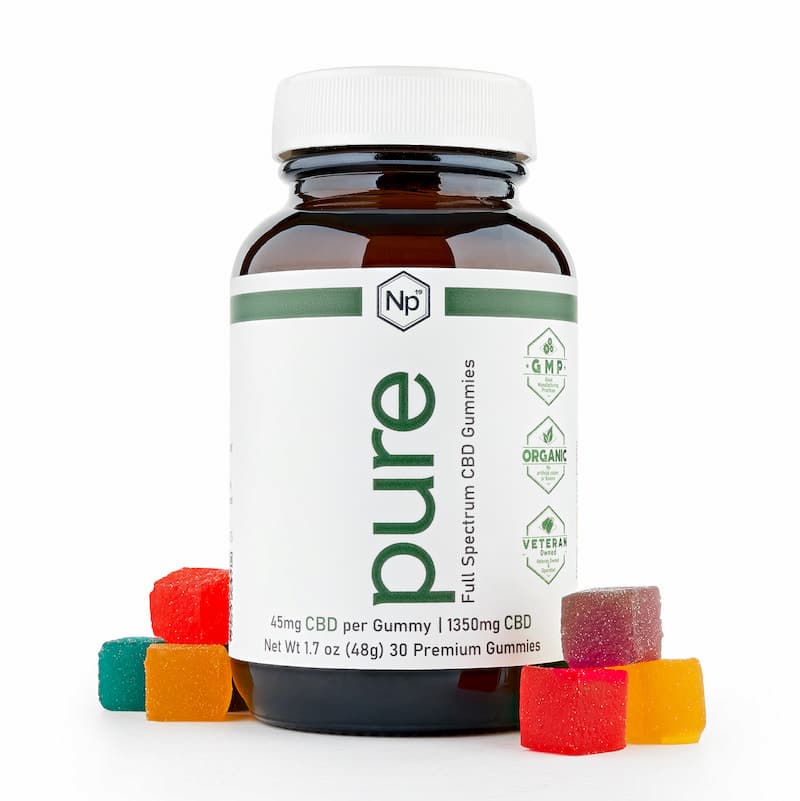
As the ECS is triggered because of this problem, it can become overactive and increase gut permeability. CBD steps in and counteracts this effect by supporting the ECS to repair and regulate the problem.
CBD for gut health helps relieve the pain felt when gut and microbiome conditions like this occur. This pain also indicates other underlying conditions like irritable bowel syndrome, ulcerative colitis, and Crohn’s disease.
Try Using CBD Gummies for Painful Guts
Using CBD gummies for pain relief is a great way to incorporate CBD into any painful symptoms your intestinal tract may have. One of our pure CBD gummies contains 45 mg of CBD per gummy, which is enough for one serving of pain relief. This is a natural way to get some form of relief, without having to deal with doctors or the pharmacy line.
What Else Can You Do About Gut Problems?
If you are dealing with gut problems, there are a few things you can try alongside your CBD dosage to help alleviate your condition:
- Diet – Eat plenty of vegetables, fruit, and fibers to help assist the gut.
- Probiotics and prebiotics – These give the gut the good bacteria it needs.
- Fermented foods – Eating foods like yogurt and sauerkraut that contain healthy bacteria.
- Fewer antibiotics – Always check with your doctor before reducing or stopping any prescription, but constant antibiotic use can kill both bad and good gut bacteria.
- Hemp oil and fatty acids – Hemp oil is rich in essential fatty acids omega-6 and omega-3. This is good for gut health as well as brain and hormone health.
Summary – CBD for Gut Health
Adding CBD to your daily routine seems to offer more to your system than just gut health. It can benefit many other systems while healing the gut. However, strengthening the GI tract is the first step to helping several other systems. Adding CBD for gut health reinforces and promotes a better functioning immune system and overall body health.
CBD helps balance the microbiome of the gut; this helps alleviate mental health issues and improves a person’s mood and outlook on life. CBD reduces the stresses on the body, both physical and mental. All of this working together puts a system at ease, allowing for better absorption and digestion of the food you eat.
Talk to your doctor before you begin taking CBD to make sure it’s right for you. When you’re ready to start exploring CBD for gut health, talk to the folks at New Phase Blends. We have all of the information you need to begin your CBD journey.



